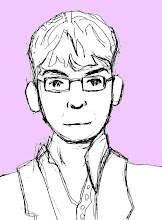A key part of writing is self reflection. Though you should always hand out your work to peers for feedback, you should also try to identify the worst aspects of your writing yourself. If you can do that, then you needn't speak to anyone ever again apart from your publisher and your accountant, who will be looking after all the money you make from your big seller. I think that's what J.K Rowling is like. I don't think she even talks to her kids anymore. Has anyone actually seen them? I think she probably killed them years ago and dissolved their bodies with acid... Maybe that's libelous?
As I have stressed before, grammar and spelling isn't really that important, so don't try and edit yourself that way. No point, just let the programme do it. It's all about trying to pick out the weakest points of your plot, and thinking about what you can change for the better. Most things in genre writing are thrown in for impact rather than plot, so maybe you should think about what would wow your audience more. Think BIG. If you've got a space cruiser in your story, add a few more cannons and misshapen wings. If you're writing literary fiction, make your handicapped character even more disabled, like someone in a wheelchair, but also has tourrets, stuff like that.
Speaking of character, adding a few more never hurts a story. Even if they are tiny and more or less inconsequential, they enrich a story and give the universe more flavour and validity. Just look at dense works like Star Wars and Lord of the Rings. Millions of characters, most of which named, all more or less pointless, but fun all the same. I heard that Hannibal Lector wasn't even in Silence of the Lambs until the very end when the author decided he needed a bit of novelty.
Also, be on the look out for phrases that repeat, you don't want to repeat yourself. I once presented a piece of writing to a publisher that had the phrase 'but that wasn't even the half of it' seven times in five hundred words. That was embarrassing. We managed to compromise on it only occurring three times, just to make sure it wouldn't look silly.
It might be useful practise to re-read your favourite book and try your best to pick it apart and say what you would have done better. For example, one of my favourite novels is the Oliver Twist by Charles Dickens. I've always thought it would have worked better is Oliver was a girl instead of a boy, would have really put an edge on it, made the whole thing a lot more seedy and depressing. Olevera Twist. I also tried to do this with Wizard of Oz, but it didn't really work, you can't really criticise perfection.
Adios friends,
Matthew Rain
Wednesday, 1 April 2009
Subscribe to:
Post Comments (Atom)

No comments:
Post a Comment